I have a situation when I need to show the balance for each user, in relation to other users.
Table structure & dummy data script:
CREATE TABLE transactions (
id INT(6) UNSIGNED AUTO_INCREMENT PRIMARY KEY,
user1 INT NOT NULL,
user2 INT NOT NULL,
amount INT NOT NULL
);
INSERT INTO transactions VALUES(1, 1, 2, 10);
INSERT INTO transactions VALUES(2, 1, 3, 15);
INSERT INTO transactions VALUES(3, 4, 1, 25);
INSERT INTO transactions VALUES(4, 1, 5, 20);
INSERT INTO transactions VALUES(5, 5, 1, 18);
INSERT INTO transactions VALUES(6, 5, 1, 2);
Result:
Now I want to sum-up information (balances) for user = 1. The result that I want to see is this:
user balance
2 10
3 15
4 -25
5 0
Now, I am using the latest stable MySQL version 5.7.17-0ubuntu0.16.04.1.
And I have 2 problems:
- MySQL does not support
FULL OUTER JOINclause - MySQL does not support
WITHclause
My hands are tied at this point. I want to write a fast and efficient query for above situation. Here are my two attempts (none is working):
This one is not working because I can not use FULL OUTER JOIN clause
SELECT IFNULL(t3.user, t4.user), IFNULL(t3.amount, 0) - IFNULL(t4.amount, 0)
FROM (
select t1.user2 user, sum(t1.amount) amount
from transactions t1
where 1=1
and t1.user1 = 1
group by t1.user2
) t3
FULL OUTER JOIN (
select t2.user1 user, sum(t2.amount) amount
from transactions t2
where 1=1
and t2.user2 = 1
group by t2.user1
) t4 ON t3.user = t4.user
This one is not working because I can not use WITH clause
WITH t3 AS
(
select t1.user2 user, sum(t1.amount) amount
from transactions t1
where 1=1
and t1.user1 = 1
group by t1.user2
),
t4 AS
(
select t2.user1 user, sum(t2.amount) amount
from transactions t2
where 1=1
and t2.user2 = 1
group by t2.user1
)
SELECT
t1.user,
IFNULL(t3.amount, 0) - IFNULL(t4.amount, 0) balance
FROM t1
LEFT JOIN t3 ON t1.user = t2.user
UNION
SELECT t2.user FROM t1
RIGHT JOIN t3 ON t1.user = t2.user
Update
Using the solution provided by Gurwinder Singh I was able to test the performance for both queries on around 5 millions of rows of test data (although number of data where either user1 = 1 or user2 = 1 - is far less than that).
and (with union)
accordingly. Query 1 is 34% faster ((3.4-2.24)/3.4*100 = 34).
Note that there are no indexes on this table. I will later try to do the same kind of testing using MariaDB and compare the results.
Update 2
After indexing columns: user1, user2, amount the situation has changed.
Query 1 run time:
Showing rows 0 - 2 (3 total, Query took 1.9857 seconds.)
Query 2 run time:
Showing rows 0 - 2 (3 total, Query took 1.5641 seconds.)
But I still think that this is quite bad result. Maybe I will put some triggers to update the balance into a dedicated table. But at this point the answer is answered.


